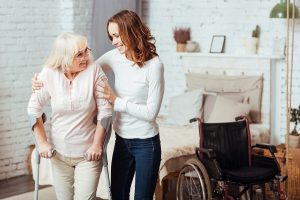Assistive devices such as canes, walkers, scooters, and more help your loved one to be safely mobile. Unfortunately, some elderly loved ones might flat out refuse to use these types of device. What can you do then?

Homecare Jamaica NY – Does Your Loved One Believe that Assistive Devices Make Her Weaker?
Examine Where the Belief Comes From
For many elderly loved ones, they witnessed an elderly loved one of their own who used these types of devices and then their health failed. This creates a belief that the device itself contributes to a worsening health condition. Your loved one might also have a belief that this type of device removes some of her independence, even though it can help her to be more independent. Understanding where this refusal comes from can help you to come up with a solution that works for your loved one and keeps her safe.
Figure out if There Is a Device She Will Use
Some loved ones have a bias against a specific type of assistive device. For example, some people will use a cane with no problem, but if you try to suggest a walker or any other type of device, that's not going to work. It's possible that multiple devices could be acceptable for your loved one's situation. Figuring out which ones she'll actually use is the key.
Have a Physical Therapist Help with Fitting the Device
Almost every assistive device functions better if it's properly fitted. For canes, this means adjusted to the right height with the right tip installed in the bottom. Other devices, such as walkers, also need adjusting as well. If your loved one's doctor or physical therapist can adjust these devices for your loved one, she'll have a much better time using them and may be more likely to continue using them.
Talk to Her Doctor if She Still Resists the Idea
If your loved one is still against the idea of using any assistive devices, make sure you talk to her doctor about the situation. He may be able to suggest another option in terms of devices or he might have some further advice that can help you to make the idea more appealing for your loved one.
You might also want to consider hiring homecare providers to help your loved one, whether she's still resisting assistive devices or not.
